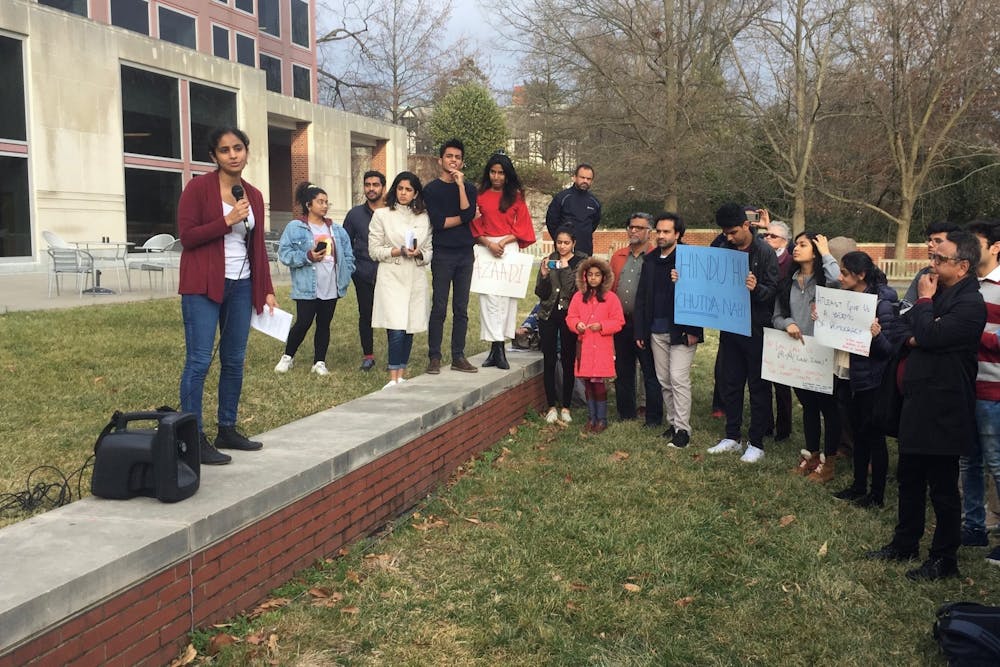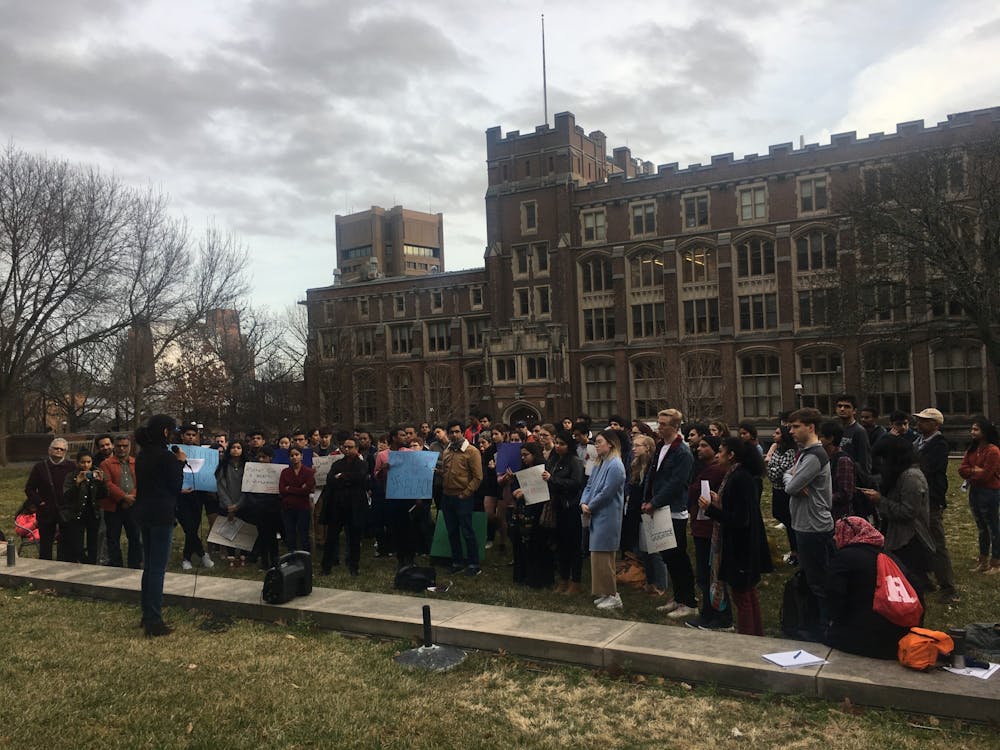Around 100 students, professors, and community members gathered on Saturday outside of Frist Campus Center to learn about and protest against the Indian government’s Citizenship Amendment Act (CAA), enacted on Dec. 11.
The CAA offers citizenship to Hindus, Sikhs, Buddhists, Jains, Christians, and Parsis from India’s neighboring countries (specifically Pakistan, Afghanistan, and Bangladesh) who are facing and have faced religious persecution. Notably, the CAA excludes Muslims, who comprise the majority of India’s non-Hindu population, according to India’s most recent census.
The undergraduates who organized the teach-in and silent protest stood in solidarity with student protestors in India, who first demonstrated at Jamia Millia Islamia and Aligarh Muslim University (AMU), two predominantly Muslim universities, and now include thousands of people across the country. In recent weeks, the Indian government, led by Prime Minister Narendra Modi, has cracked down on protestors, with 25 deaths reported as of Jan. 10.
“I can stand here and feel assured — as I should be — that I’m not going to be tear-gassed and dragged away, and that is not a reality for students [in India],” said Aparna Shankar ’21, one of the student organizers. While home for winter break, Shankar participated in protests — including a march led by a coalition of women, trans, and queer people — in New Delhi.
The organizers previously circulated a statement of solidarity, published with 215 student signatures in The Daily Princetonian on Dec. 21. According to Shankar, they are currently working with the cross-institutional organization Holi Against Hindutva, and members of the University’s Hindu Society have signed on to their open letter. The letter was written by Yale South Asian Society Political Chair Shreeya Singh and edited by Kamya Yadav ’21.
The protest comes on the heels of a Jan. 5 incident, when masked assailants attacked anti-CAA and Muslim students at Jawaharlal Nehru University (JNU), sending 30 people to the hospital, while police stationed at the university reportedly stood by. The event also falls within a wave of anti-CAA campus protests around the world, including at peer institutions such as Harvard and Oxford, that took place in late December in light of events in Jamia where law enforcement fired bullets on unarmed citizens on Dec. 15.
For many of the protestors, the matter is not only political, but also personal.
“I’m from India, so I feel really personally invested,” said Kanishkh Kanodia ’23. “Just because we’re not in India doesn’t mean there’s nothing we can do.”

Kanodia is a contributor for The Daily Princetonian.
Others attended to fill gaps in their knowledge.
“I heard it’s a teach-in, and I wanted to learn more,” said Akshay Yelleshpur Skrikant, an attendee and a graduate student in the physics department.
Herself an alumnus of JNU and an assistant professor of history at the University, Divya Cherian opened the event with an explanation of the CAA, the National Register of Citizens (NRC), and the ways in which she believes the Bharatiya Janata Party (BJP), headed by Modi, aims to use both to discriminate against Muslims.


Professor Divya Cherian spoke at the anti-CAA protest.
Photo Credit: Jon Ort / The Daily Princetonian
Cherian explained that a national register published in December found 1.9 million people living illegally in Assam, a northeastern region of India. Surprisingly for the BJP, many of the people listed were not Muslims, but rather Hindus — a finding that was “politically expensive” for the party, according to Cherian.
“But as we say in India, not to worry, they had a back-up plan,” she said. “That back-up plan was the CAA.”
Cherian said skeptics may ask protestors “what is wrong with knowing who is your citizen and who is not, with counting every person in your domain and verifying who is legally here and who is not?” To these objections, she would respond by saying that India never had the kinds of documentation one would need to prove citizenship, with many people lacking birth certificates or having birth certificates from sources other than the official health department.
“This is where the CAA and this list of citizens combine beautifully,” she added. “The people who are found to be non-citizens, who are Hindu, who are Jain, who are Sikh — basically everyone who is not Muslim — will be caught by the CAA and be put on the path to citizenship.”
“And what will happen to every single Muslim who is not able to prove by this impossible standard that they are citizens of India is that they will be put in detention camps,” thus rendering swaths of the population permanently stateless, she continued. “There is one already in Assam, in Punjab, and many more I’m sure will be built.”
Gyan Prakash, another JNU alum and the Dayton-Stockton Professor of History at the University, spoke next, commending the student organizers. He found it fitting that young people had organized the event, as he had observed in New Delhi two weeks prior, “not only the entire city, but the entire nation, was consumed by protests that were all organized and led by students.”
Prakash emphasized that the protesters’ message is “We are Muslims and Indians, not Muslims but Indians.” He criticized those who have advised Muslim women not to display or embrace their religious identity during the protests.
“Why wouldn’t they?” he asked. “Their religious identity is under attack. It’s been attacked since 2014 at least … So, women come in their hijabs, come with their Muslim symbols, and assert they are Muslim citizens.”
To finish his speech, Prakash led a call-and-response chant of “What do we want?” with the audience demanding “Azaadi,” which translates to “freedom” from Hindi.
Sadaf Jaffer, a postdoctoral research associate at the Princeton Institute for International and Regional Studies (PIIRS) and New Jersey’s first female South Asian mayor, addressed protestors next, remarking that the past few weeks “have been some very dark times” and reflecting on her personal love for India.
She called on attendees to sign the open letter drafted by the Global Indian Progressive Alliance, call or email their congressional representatives, and speak out against hate where they see it.
The guest speakers were followed by several undergraduate students, beginning with Moin Mir ’22, a native of Kashmir, a Muslim-majority territory in northern India of about seven million people. Kashmir has been subject to five months of a digital communications blackout, part of what Mir described as the “longest blockade in any democracy ever.”
“News that does manage to come out of the region is mostly through local journalists, who are working without the Internet and with the administration constantly on their backs,” he explained.
“Indiscriminate detention of kids as young as 13, nighttime raids, propagation of fear among the masses by showing military might, use of pellet guns on unarmed teenagers, mental torture, sexual violence … this is the normal of Kashmir,” Mir said. “This is the normal I had to grow up watching.”
Mir went on to say that the world is now seeing the brutality of India’s government unfold on a massive scale, reflecting the militarized occupation under which Kashmiris have suffered for decades.
“The silence of the Indian left on the crimes of the Indian state in Kashmir is nothing but sheer hypocrisy,” he said, adding that he applauds the organizers of the event for not “forcing their own narrative of Kashmir” when they had the chance to let a Kashmiri speak for himself.
Kanodia, who spoke of India’s secularism as one of its fundamental tenets, followed Mir. Kanodia condemned the BJP’s singular agenda to undermine that secularism in favor of a Hindu nationalist, or “Hindutva,” state.
“Hinduism is unique because it promotes inclusiveness,” he said. “Hindutva promotes exclusivity, promotes fear and hatred against Islam, against Christianity, against all the religions of the world.”
Students went on to address the stifling of free speech in India, the suppression of student activism, and the potentially harmful rhetoric in the Indian diaspora.
“The beginning of any revolution, any force of resistance, is education,” said Yadav, the final speaker, and thanked everyone who attended the teach-in.
At the conclusion of the event, organizer Arya Goel ’20 led the crowd in a recitation of the preamble to the Constitution of India.
The event was co-sponsored by the Carl A. Fields Center and the University’s South Asian Students Association and took place at 3 p.m. on Jan. 12. Organizers are currently in talks with other undergraduate and graduate students on creating a more long-term coalition for discussing and holding events on these issues, according to Shankar.








